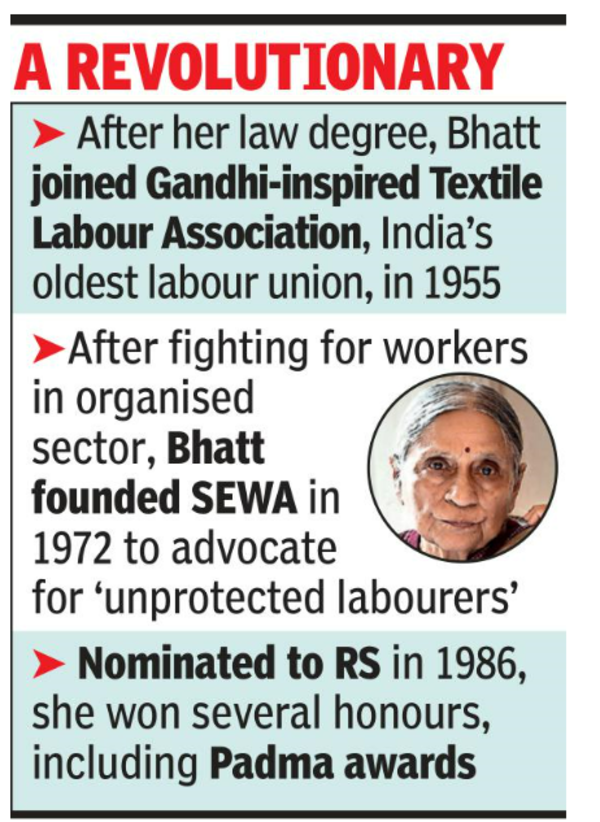Bhatt was 89 and is survived by her son Mihir, daughter-in-law and SEWA director Reema Nanavati and two grandsons. Scores of leaders offered their tributes to Bhatt, who championed the cause of marginalized women, giving dignity, livelihood and leadership ability to millions at the grassroots level.
“Sad to know about the death of Elaben Bhatt. She will be remembered long for her work for the promotion of women empowerment, social service and education among the youth. Condolences to her family members and admirers,” PM Narendra Modi tweeted in Gujarati.

Bhatt, an exemplar of Gandhian principles, believed simplicity to be a virtue that can solve most world problems. Her spartan residence’s adornments were books on India and Gujarat. Art on her home’s walls were her grandsons’ drawings.
In a corner of a room at her home lies a set of tablas with which Bhatt practised singing classical music for two hours daily. “Riyaaz and yoga were non-negotiable. She always had a song in her. In fact, she also sang in the ICU,” Rameshwar, one of her grandsons, said.
On Wednesday, a large number of SEWA members choked as they hummed ‘Ame paar karishu’, a Gujarati version of ‘We shall overcome’. The Gujarati variant had been penned by Bhatt and had become SEWA’s anthem of sorts. “Elaben envisaged and implemented a leadership strategy in which the daughter of a farm worker could rise to the top as the general secretary of SEWA,” a member said.
Bhatt’s influence inspired many world notables, including former US secretary of state Hillary Clinton, who called Bhatt her ‘personal hero’. Clinton visited SEWA’s office in Ahmedabad twice and has publicly lauded SEWA’s micro-finance work.
Ahmedabad was the crucible of Bhatt’s mission. After completing her law degree, she joined Mahatma Gandhi inspired Textile Labour Association (TLA), India’s oldest labour union, in 1955. After fighting for workers in the organised sector, Bhatt founded SEWA in 1972 to advocate for ‘unprotected labourers’ in the informal sector, who constituted 89% of the workforce back then. A majority of such workers were poor women. In 1974, Bhatt set up a cooperative bank to provide micro loans to women. She went on to co-found Women’s World Banking (WWB), a global network of microfinance organisations, of which she was the chairperson from 1984 to 1988.
In 1986, she was nominated to the Rajya Sabha. In Parliament, she chaired the National Commission on Self-Employed Women, which was established to investigate the conditions of poor women workers.
Bhatt served as an adviser to multilateral organisations such as the World Bank on matters relating to microfinance, banking and anti-poverty programmes. In 2007, she joined The Elders, a group of world leaders founded by Nelson Mandela to promote human rights and peace. She became an emeritus member of the group in 2016.
Led by Bhatt, SEWA achieved global recognition when after a 17-year struggle, International Labour Organization (ILO) recognised the association as a labour union. Locally, SEWA recorded a major win when India in 2014 passed the Street Vendors (Protection of Livelihood and Regulation of Street Vending) Act, a major law recognizing the rights of workers in the unorganised sector.
Along her journey, Bhatt was nationally and internationally feted with honours, including Padma Shri, Padma BhushanMagsaysay Award for Community Leadership and France’s Legion of Honor.
In her later years, Bhatt became the second woman chancellor of Gujarat Vidyapith, an institution founded by Mahatma Gandhi. Her resignation was accepted last month. She continued to be the chairperson of Sabarmati Ashram Preservation and Memorial Trust (SAPMT).
Bhatt had stopped travelling for some time due to age-related problems. However, she enthusiastically helmed the 50th anniversary celebrations of SEWA earlier this year. “Without 50 per cent of the population, we can’t march forward. We’ve not been leaders, we’ve not even been recognised as workers. Women need to take themselves more seriously,” she had said.






